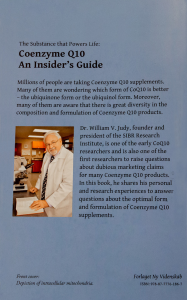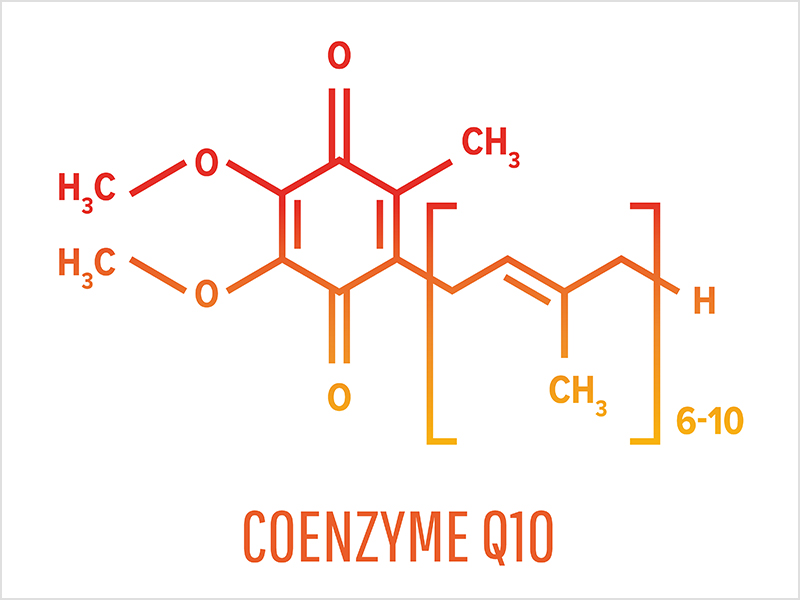
In the February and March 2019 issues of WholeFoods magazine, the long-time Coenzyme Q10 clinical researcher, Dr. William V. Judy, warns: Buyer beware. CoQ10 supplements do not give equal absorption. It is important to buy a CoQ10 supplement that has documented absorption and bioavailability and that has documented beneficial heart health effects.
Coenzyme Q10 is an essential bio-nutrient that has vitamin-like properties.
- It is a vital co-factor in the cellular process of ATP energy generation.
- It is an important lipid-soluble antioxidant. It has anti-inflammatory effects.
- Substantial reduction of bio-markers for oxidative stress and inflammation has been seen in several randomized controlled trials [Martelli 2020].
Coenzyme Q10 is a redox molecule, having both an oxidized form (ubiquinone) and a reduced form (ubiquinol).
- Several enzyme systems facilitate the conversion of the ubiquinone form of Coenzyme Q10 to the ubiquinol form. It is not necessary to take a ubiquinol supplement to get enough ubiquinol in the plasma and circulating lipoproteins [Mohr 1992].
- Absorption of Coenzyme Q10 from commercially available supplements varies widely. Marketing claims for a superior absorption of ubiquinol supplements seem to be misleading.
- A 2019 double-blind crossover study has shown that a well-formulated ubiquinone supplement – with the correct carrier oils, the correct heating and cooling process, the correct excipients – gave significantly better bioavailability than did a ubiquinol supplement. The ubiquinol supplement used in the study did, however, outperform a ubiquinone supplement that did not have the proper formulation and processing [Lopez-Lluch 2019].
CoQ10 Supplementation and Heart Disease Risk Factors
Coenzyme Q10 and Heart Failure
In the Q-Symbio Study, researchers gave chronic heart failure patients 300 mg/day (3 x 100 mg in divided dosages) or matching placebos for two years.
- The CoQ10 adjuvant treatment significantly improved the symptoms, quality of life, and survival of the heart failure patients [Mortensen 2014].
- A sub-analysis of the European segment of the international multi-center Q-Symbio Study showed that the CoQ10 intervention also significantly improved the patients’ ejection fraction [Mortensen 2019].
Coenzyme Q10 and High Blood Pressure
Older meta-analyses of the effect of Coenzyme Q10 on hypertension showed significant reductions in both systolic and diastolic blood pressure [Rosenfeldt 2007; Ho 2009]. A more recent meta-analysis has shown that CoQ10 supplementation is associated with a significant reduction in systolic blood pressure but not in diastolic blood pressure in patients with metabolic syndrome [Tabrizi 2018].

For a more extensive summary of the clinical applications of Coenzyme Q10 supplementation, please see Dr. Judy’s 2018 book. It is available from amazon.com. ISBN: 978-87-7776-186-7
Coenzyme Q10 and Type 2 Diabetes and Insulin Resistance
In patients with metabolic syndrome, supplementation with 100 mg/day of Coenzyme Q10 for eight weeks significantly improved serum insulin levels, HOMA-IR insulin resistance, HOMA-β beta cell function, and total antioxidant capacity compared to placebo [Raygan 2016].
In a meta-analysis of 14 clinical trials enrolling 693 overweight/obese diabetic subjects, intervention with Coenzyme Q10 significantly reduced fasting blood glucose, hemoglobin A1c levels, and triglyceride levels.
- Subgroup analysis of the data showed that low-dose consumption of CoQ10 (<200 mg/day) effectively reduced fasting blood glucose levels, HbA1c levels, fasting blood insulin levels, homeostatic model, and assessment of insulin resistance levels.
- The CoQ10 treatment was well tolerated by the patients with metabolic syndrome.
- The researchers concluded that daily CoQ10 supplementation has beneficial effects on glucose control and lipid management in overweight and obese patients with type 2 diabetes [Huang 2018].
Coenzyme Q10 and Systemic Inflammation
A 2019 meta-analysis of nine randomized controlled trials enrolling 509 patients showed that daily supplementation with Coenzyme Q10 significantly reduced the blood levels of bio-markers for systemic inflammation: tumor necrosis factor-alpha and interleukin-6 [Farsi 2019].
A 2017 meta-analysis showed a significant association between CoQ10 supplementation and reductions of the same bio-markers for inflammation mentioned above as well as significant reductions in the C-reactive protein levels [Fan 2017].
In a four-year study of the supplementation of senior citizens with 200 mg/day of Coenzyme Q10 and 200 mcg/day of selenium, researchers documented significant reductions in various bio-markers for systemic inflammation [Alehagen 2015, Alehagen 2019].
Coenzyme Q10 and Statin Medications
In 2015, Okuyama et al published an article explaining the pharmacological mechanisms by which statin medications may actually stimulate the development of atherosclerosis and heart failure.
- The researchers posited that statins may cause coronary artery calcification and may function as mitochondrial toxins that impair muscle function in the heart and blood vessels.
- Statins inhibit the bio-synthesis of Coenzyme Q10 and heme A, both necessary for the generation of ATP energy.
- Furthermore, statins inhibit the body’s synthesis of vitamin K 2 and inhibits the body’s synthesis of selenium containing proteins, including the antioxidative glutathione peroxidase enzymes [Okuyama 2015].
In a 2018 meta-analysis, researchers analyzed the data from 12 randomized controlled trials with a total of 575 patients enrolled: 294 patients in the CoQ10 supplementation group and 281 in the placebo group. Compared with placebo, the CoQ10 supplementation ameliorated statin-associated muscle symptoms, such as muscle, muscle weakness, muscle cramp, and muscle tiredness. The researchers concluded that CoQ10 supplementation may be a useful complementary therapy for the management of statin-induced myopathy [Qu 2018].
Key Points: CoQ10 and Clinical Applications
- Our bodies’ bio-synthesis of Coenzyme Q10 declines with increasing age as we pass from our 20s into maturity [Kalen 1989].
- Disease conditions and the use of statin medications are associated with reduced CoQ10 status.
- The bioavailability of commercially available CoQ10 supplements varies considerably. It is important to buy a well-documented CoQ10 product.
- It is not necessary to take a ubiquinol supplement to get significant increases in ubiquinol levels in plasma and lipoproteins.
- It is important to take the CoQ10 supplement with meals containing some fat. Divided doses will give better absorption than one large daily dosage.
- Coenzyme Q10 adjuvant treatment of chronic heart failure patients, hypertension patients, and type 2 diabetes patients has documented beneficial effects.
Read our key article about CoQ10 and cardiovascular health in elderly people
Read our key article on CoQ10 as adjuvant therapy for heart failure
Sources
Alehagen U, Lindahl TL, Aaseth J, Svensson E, & Johansson P. Levels of sP-selectin and hs-CRP decrease with dietary intervention with selenium and coenzyme Q10 combined: a secondary analysis of a randomized clinical trial. Plos One. 2015; 10(9): e0137680.
Alehagen U, Alexander J, Aaseth J. & Larsson A. (2019). Decrease in inflammatory biomarker concentration by intervention with selenium and Coenzyme Q10: a sub-analysis of osteopontin, osteoprotergerin, TNFr1, TNFr2, and TWEAK. Journal of Inflammation. 2019; 16(5): 1-9.
Fan L, Feng Y, Chen GC, Qin LQ, Fu C, & Chen LH. Effects of coenzyme Q10 supplementation on inflammatory markers: A systematic review and meta-analysis of randomized controlled. Pharmacological Research. 2017. 119: 128–136.
Farsi F, Mohammadshahi M, Alavinejad P & Rezazadeh A. Functions of Coenzyme Q10 supplementation on liver enzymes, markers of systemic inflammation, and adipokines in patients affected by nonalcoholic fatty liver disease. J Am Coll Nutr; 35: 346-53.
Ho MJ, Bellusci A & Wright JM. Blood pressure lowering efficacy of coenzyme Q10 for primary hypertension. Cochrane Database Syst Rev. 2009; CD007435.
Huang H, Chi H, Liao D & Zou Y. Effects of coenzyme Q10 on cardiovascular and metabolic biomarkers in overweight and obese patients with type 2 diabetes mellitus: a pooled analysis. Diabetes Metab Syndr Obes. 2018; 29(11): 875-886.
Lopez-Lluch G, del Pozo-Cruz J, Sanchez-Cuesta A, Cortes-Rodriguez AB & Navas P.: Bioavailability of Coenzyme Q10 supplements depends on carrier lipids and solubilization. Nutrients. 2019; 57: 133-40.
Martelli A, Testai L, Colletti A & Cicero AFG. Coenzyme Q10: Clinical Applications in Cardiovascular Diseases. Antioxidants. 2020; 9: 341.
Mohr D, Bowry VW & Stocker R. Dietary supplementation with coenzyme Q10 results in increased levels of ubiquinol-10 within circulating lipoproteins. Biochim Biophys Acta. 1992; 1126: 247-54.
Mortensen SA, Rosenfeldt F, Kumar A, Dolliner P, Filipiak KJ, Pella D & Littarru GP. The effect of coenzyme Q10 on morbidity and mortality in chronic heart results from Q-SYMBIO: a randomized double-blind trial. JACC. Heart Failure. 2014; 2(6): 641-649.
Mortensen AL, Rosenfeldt F. & Filipiak KJ. Effect of Coenzyme Q10 in Europeans with chronic heart failure: A sub-group analysis of the Q-Symbio randomized double-blind study. Cardiology Journal. 2019: 26(2): 147-156.
Qu H, Guo M, Chai H & Wang WT. Effects of Coenzyme Q10 on statin-induced myopathy: an updated meta-analysis of randomized controlled trials. J Am Heart Assoc. 2018; 19: e009835.
Raygan F, Rezavandi Z, Dadkhah Tehrani S, Farrokhian A, & Asemi Z. The effects of coenzyme Q10 administration on glucose homeostasis parameters, lipid profiles, biomarkers of inflammation and oxidative stress in patients with metabolic syndrome. European Journal of Nutrition. 2016; 55(8): 2357–2364.
Rosenfeldt FL, Haas SJ, Krum H & Hadj A. Coenzyme Q10 in the treatment of hypertension: a meta-analysis of the clinical trials. J Hum Hypertens. 2007; 21: 297-306.
Tabrizi R, Akbari M, Sharifi N & Lankarani KB.: The Effects of Coenzyme Q10 supplementation on blood pressure among patients with metabolic diseases. High Blood Press Cardiovasc Prev. 2018; 25: 41-50.
The information presented in this review article is not intended as medical advice and should not be used as such.
15 June 2020








Leave A Comment